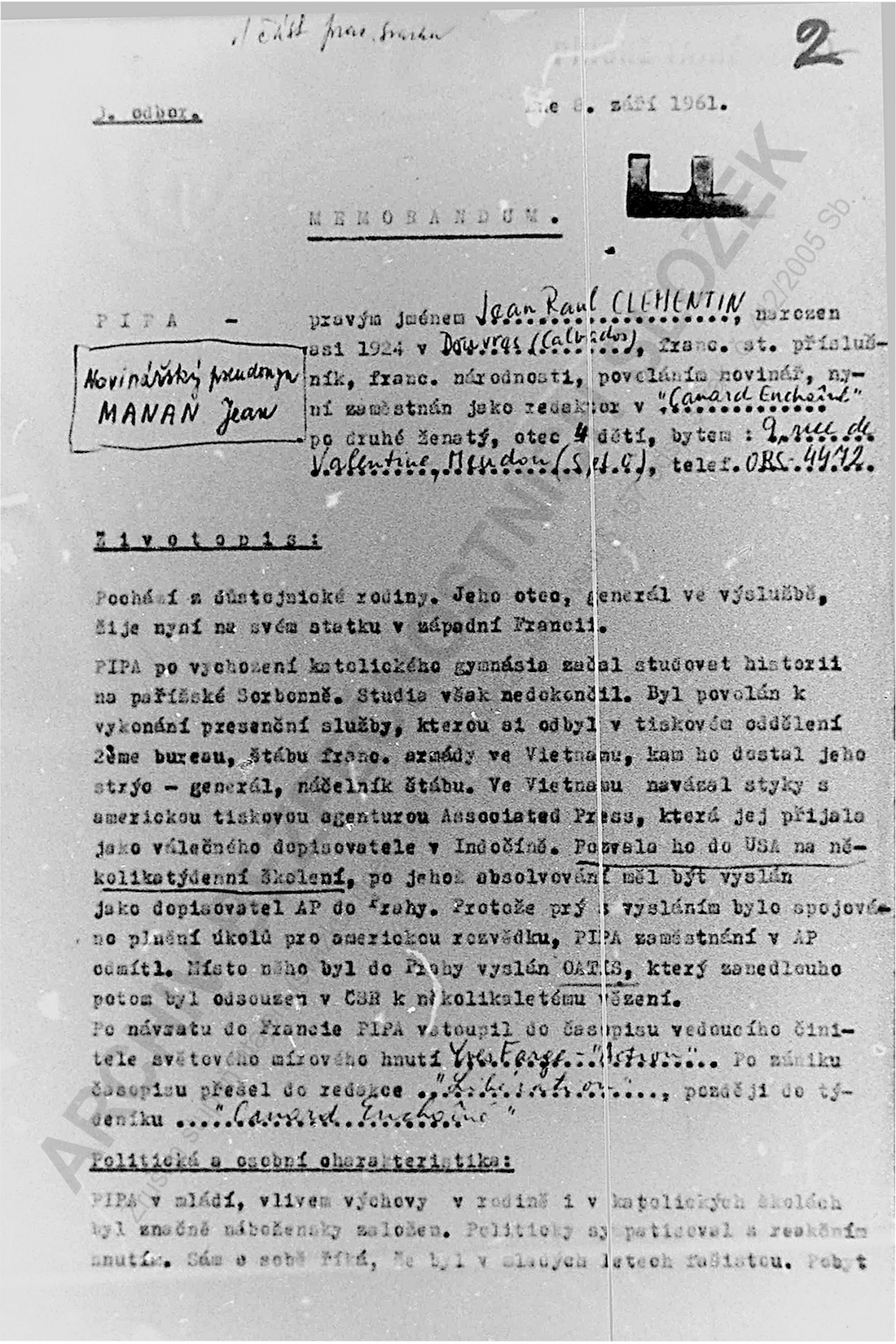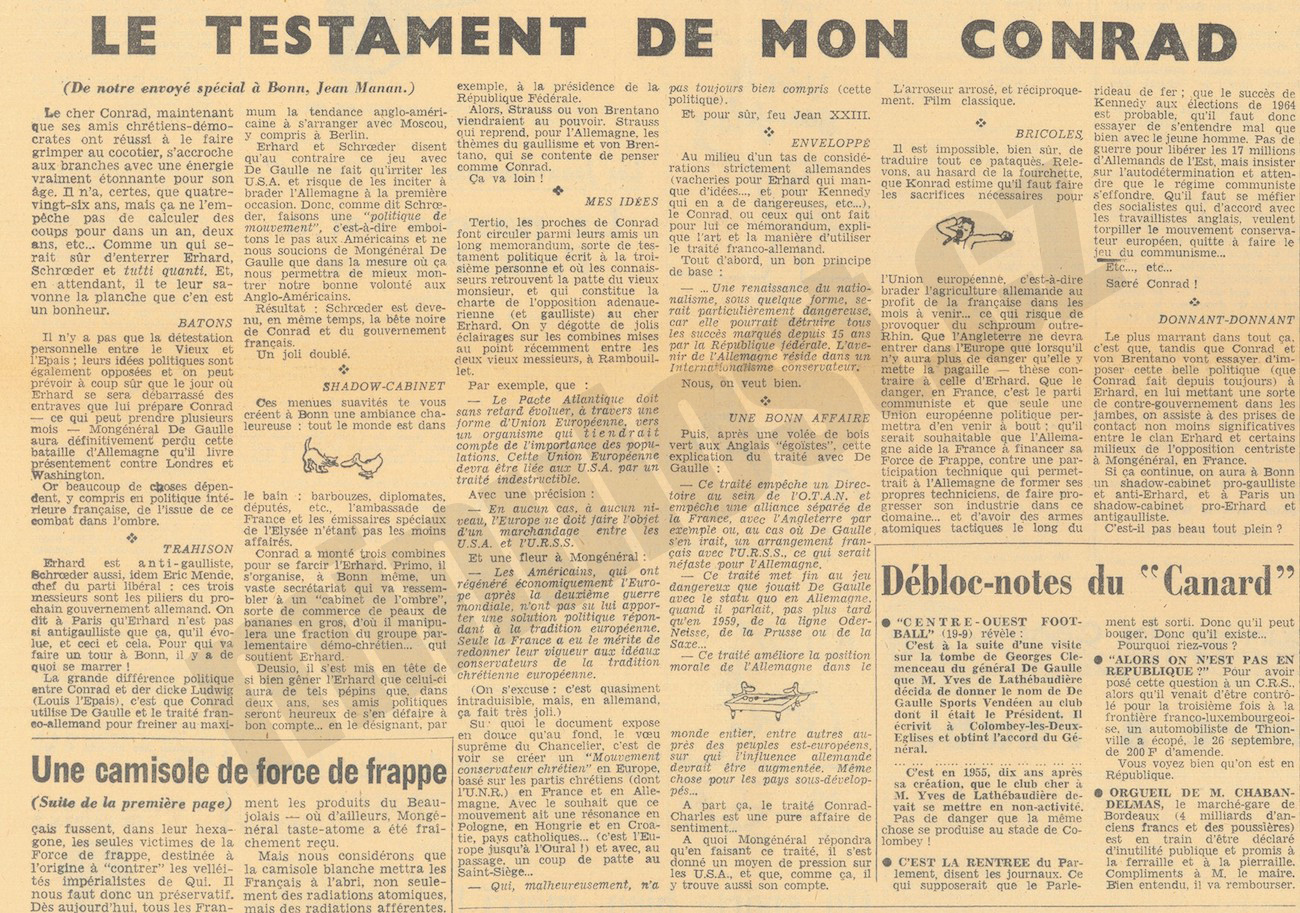Fake political will of Konrad Adenauer published in Le Canard enchaîné by an StB agent in 1963
By Radek Schovánek
In every country where communist dictatorships have ruled, the political police have played an important role in society. Their numbers far exceed the size of police forces in democratic countries. The secret police's task is to control and suppress any forms of disagreement with the regime. In the late 1940s and early 1950s especially, the State security (StB) used terrorist tactics against its inhabitants.
After the Communist coup in Czechoslovakia in February 1948, a segment of society resisted the advent of totalitarianism. The regime responded with terror and the intimidation of real and imagined enemies. Political trials were staged and broadcasted on the radio, and draconian punishments were imposed. Not only politicians from non-communist parties, but also priests, peasants, scouts and, ultimately, the very Communist Party leaders who initiated the whole criminal process, stood before the courts.
State security infiltrated many resistance organizations and even established some themselves. In the Final Report of the Ministry of the Interior on the Ministry of the Interior commission investigation into the illegal working methods of military intelligence between 1949 and 1954, it is stated: "Provocation was carried out in various forms and with ingenious sophistication. One of the most popular forms of provocation was sending anti-state leaflets to officers. Those who did not report the leaflets to the OBZ (military counterintelligence) were found unreliable and discharged from the army or arrested.“[1]
Following the consolidation of the Communist Party's power, provocation and discreditation campaigns focused mainly on Western countries. The Minister of the Interior Rudolf Barák began to build a strong foreign intelligence service, to which he enlisted many members of counterintelligence units who had extensive experience in provocation. In the 1950s, intelligence services kidnapped dozens of "people of interest" from Austria and the Federal Republic of Germany[2] State security also carried out several assassinations, probably the most famous being Operation Kamfverband[3] or the poisoning of Béla Lapusnyik with dimethylsulfate.[4] Such violent actions always prompted retaliation from Western counterintelligence and extensive investigations. The murder of defector Jan Kondek on 20 September 1966 in Paris even led to the imprisonment of a resident of the Czechoslovak military intelligence in France.[5]
Active Measure – The Will
Given the changing political situation in Europe and the ever-improving efforts of foreign counterintelligence, over time state security resorted less and less to violent actions that attracted international attention and set Western public opinion against the Soviet Union and its satellites. Intelligence gradually shifted to active and influence measures aimed at weakening the position of Western countries, their alliances and friendly relations, or at discrediting notable Western politicians in a way that would not be directly linked to the actions of communist countries. One such operation was the Czechoslovak Intelligence Service (Directorate I of the Ministry of the Interior) active measure code named The Will.
In December 1957, personal file 41582 was registered with the code name Pipa. Member of the 3rd department of the 1st division Lieutenant Vladimír "The Hook" Hocek requested the opening of a file for Jean Raoul Clementin: "We are working with this person as an agent and he is providing interesting news"[6] and on the basis of this vague justification, the French journalist was registered as an agent of the Communist intelligence.
Intelligence agents made first contact with him in 1954 already, when he worked for the magazine Liberatión. At the time the file was opened he was already publishing in Le Canard enchaîné under the pseudonym Jean Manan. He came from a prominent family of a general and after graduating from a Catholic high school studied history at the Sorbonne. He did not complete his studies and did his military service in the French army in Indochina. The intention was for him to also work there for the American Associated Press, however, after three months of training, they suggested he be sent to Prague as a correspondent. Due to a request that he also perform certain tasks for the CIA he turned the offer down and William Nathan Oatis was posted to Prague instead.
In the memorandum drawn up by captain Milan "Melka" Šebík, the newly acquired collaborator was "(...) a progressive intellectual. Pipa appears to be a very complex character. He is rather volatile, often changing his mind. He is highly ambitious and egoistic. Although his circle of acquaintances is quite large, Pipa does not have any real friends. He likes women and regularly exchanges one for another."[7] In the next part of the memorandum, Pipa's handler says that Pipa maintains relationships with about five women. This this is very financially demanding, and is the source of Pipa’s constant desire for money. The finding of a weakness like this is important for every intelligence service. They can offer the chosen agent "help" to solve his (often) financial problems and then use this to blackmail him.
That's also exactly what was attempted in the case of agent Pipa. It was only partially successful. The agent was not willing to divulge classified information, and most of his reports were of a "newspaper article-like nature". His handling officer often complained that he read the very same information he received from the agent, in the agent's newspaper articles the following day. Despite several attempts to obtain documents that would compromise the agent, the intelligence services ultimately settled for the publication of disinformation articles that the agent was willing to place in the magazine he worked for.
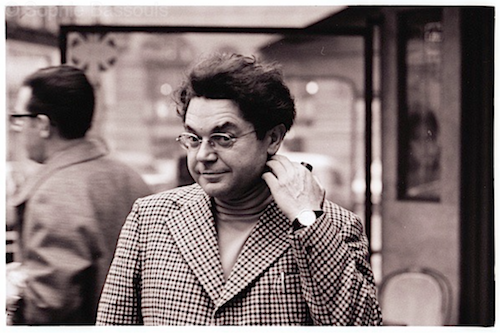
Fig. French journalist Jean Raoul Clementin, agent Pipa (reg. no. file: 41582, Czechoslovak Ministry of Interior Directorate I ). The Polish intelligence registered a file on him with the code name Jeannes (reg. no. 5110)
Photo: Sophie Bassouls
Fig. Memorandum from agency file Pipa. Source: State Security Archive
The first mention of an active measure (AM) in connection with Konrad Adenauer's resignation from the office of Chancellor of Germany appears in mail for the residentura in Paris dated 27 June 1963: “Another department is preparing an AM in connection with the resignation of Adenauer to deepen discord mainly in West Germany. It would be based on the existence of a 'will' left by Adenauer, which is to be clearly pro-French. The AM would start with the publication of a suitable article in France. We believe that Pipa could write it in Canard Enchainé. The comrades who are preparing the AM believe that it would be necessary for Pipa to make a trip to West Germany to make the source of information seem legitimate. This AM has not yet been approved. Send your opinion. The 'will' will be a fabrication. If it is not possible to get him to travel to West Germany, perhaps even for just a few days, which we would pay for, then it would at least be necessary to clarify what sources he could have "drawn" his knowledge from. Discuss his main connections with West Germany, especially political parties."[8]
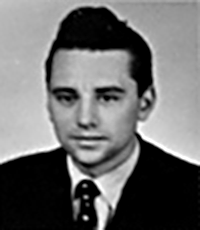 Fig. Captain Zdeněk "Motl" Mičke, Source.
Fig. Captain Zdeněk "Motl" Mičke, Source.
At a meeting on 9 August 1963, the proposed AM was introduced to Pipa by his handler Zdeněk "Motl" Mičke. "Pipa agrees with the implementation of this AM in his weekly newspaper but would like to know at least the general ideas of this "will", on the basis of which he could determine appropriate sources from which he would "draw". (...) Pipa is willing to go to Bonn for two or three days. He apparently has acquaintances there in all political circles. (...) Pipa further stated that he could possibly tell an old friend, someone in Bonn named Franken, something about the will. Franken is the publisher of a specialised publication called the "Bonner Briefe" known to have good information and the information it contains is very often published in the main newspapers and weekly journals in West Germany (...), this would make it easier for Pipa to publish the will in Paris and Canard would react with a detailed article containing "the entire will". (...)
In addition, Pipa requested that the will be drafted well and on the basis of credible facts, so that it could not be immediately verified that it is a fraud.[9] The Centre decided that it would be possible to issue a series of related texts in Le Canard enchaîné and other publications, and from September 1963 gave the upcoming AM the code name Narcissus [or "Narcissist" – this is a pun in Czech]. On 12 September 1963, in mail for the residentura in Paris instructions were provided for the implementation of AM Narcissus and for monitoring of the response (Annex 1). Nine days later, agent Pipa met with his handler "Motl" Mičke in Café Pasteur and during the 45-minute conversation that followed received materials supplied by the Centre and praised the information, believing it would fit in well with the atmosphere in which Adenauer departed from political life.
The agent promised to go to Bonn from Tuesday, 24 September to Friday, 27 September to legitimise the documents he'd obtained and promised to try to contact at least twelve political figures and some German journalists. He promised to bring to the next meeting a rough draft of the text and he planned to have the article printed on 1 October. Pipa's handler asked him for a detailed report on the trip to Bonn, with a full list of those he spoke to about the provided information. The next meeting was set for Saturday, 28 September and the article was to come out only after the approval of the Centre in Prague, which "Motl" Mičke expected on Monday, 30 September. At the meeting, the agent warned the StB not to place similar articles in any pro-communist papers, as this would undermine the whole operation. He promised to publish one larger article and then return to it with various supplements.
The next meeting between agent Pipa and his handler took place on 30 September in Café La Ferme from nine to half past nine in the evening. The agent again praised the supplied material and warned his handler that he might be followed for the next few days. "Motl" Mičke impressed upon him that it would be good to meet no later than in fourteen days' time to discuss the next steps. The agent said he was leaving for Rome for the Second Vatican Council, and his handler suggested that the next meeting take place in Rome.[10]
Fig. Title page of the newspaper Le Canard enchaîné, dated 2 October 1963, in which the active measure was published (Photo: Internet) and below the article "Le testament de mon Conrad" - the Czechoslovak Ministry of Interior Directorate I active measure “The Will”. Source: Archiv CDTR
The active measure code named The Will was published in two articles on the 2nd of October 1963. The first was published in the West German bulletin Der Diplomatische Brief by agent Pipa’s friend Rudolf Franken (see Annex 2). The second article was published by agent Pipa himself, under his pseudonym Jean Manan, in the magazine Le Canard enchaîné. The articles did not arouse any significant interest.
At a meeting on 11 October 1963 in Sarie des Routes, agent Pipa confirmed that the journalists that he had addressed agreed with his proposition, that the text of the AM was real and that no one else was really interested in the matter. In the meeting records prepared for the Centre by "Motl" Mičke he states that: "Discussed question of AM Narcissus. I strongly criticised the fact that there had been no success in getting anything published in the other French papers. Pipa constantly maintained that the people he had spoken to had not expressed any interest or had promised to write something but then had not. (...) I criticized him openly and insisted that he remedy the situation.
It was agreed:
- P. will write new things in the next issue of his magazine about the circumstances surrounding the departure of Adenauer from the office of Chancellor.
- PIPA will see Mme TABOUIS at the MFA on 14 November 1963 and will skilfully talk the thing over again (...)
Nevertheless, PIPA is not promising anything. He argued that nobody is interested in the matter, and that it seems plausible to everyone. Journalists that he knows at the MFA and some of the relevant staff of the MFA said that he had good sources and that the information was good and true. (Schricke, Lebel.).
Pipa brought along two of FRANKEN’s magazines, were the information he provided was mentioned."[11] Pipa’s handler felt that the outcome of the AM would not be well received by the Centre, because intelligence had also planned to involve its "agency friend"[12] by which they meant that they would show off the AM to the KGB and offer that they take over the ongoing disinformation campaign. The active measure that was several months in the making and had cost 4,000 DM and was supposed to generate discussion in many newspapers and magazines in France ended with two articles. Even the Centre had to indirectly admit failure, when the original addressee (The Ministry of the Interior) (Annex 3) mentioned in the header of the document was changed to "place in archives".
There are several hints in the agent's file about his possible cooperation with France's secret services. The way in which this active measure was carried out seems to reinforce this suspicion. However, the Centre did not come to this conclusion and continued to use agent Pipa for suggestions about potential collaborators.
Annex no. 1
Package no. 27/2
Date: 12 September 1963
PIPA – Instructions for the implementation of active measure NARCISSUS and monitoring of its reverberations.
At the beginning of October 1963, AM NARCISSUS, the essence of which is known to you, will be put into effect through our collaborator PIPA. We intend to put out a fake political will of ADENAUER through PIPA and thus provoke conflict between leading West German officials and between West Germany and its main political partners. The success of this operation depends on the extent to which our collaborator PIPA succeeds in getting the main ideas of this will published and manages to cause broader dissemination in the French and possibly other foreign press. For your information, we have prepared for further press releases abroad, on the assumption that we manage to get this material published through PIPA.
At the next meeting, we are planning to discuss the following with PIPA:
1) In the annex we are sending 3 documents. Document no. 1 contains a proposal of Adenauer’s will, written in the third person. PIPA will be passing this proposition off as material that he received from one of his friends in West Germany.
The second document contains an outline of the main parts of Adenauer's will and contains essentially the same basic ideas. It differs from the first proposition only in the way it is formulated. PIPA will, if necessary, claim that this material was provided by another well-informed acquaintance from West Germany on Pipa's initiative, because he wanted assurance of the credibility of the original material.
Next, at the meeting, you will hand over to PIPA quotes from some of ADENAUER's speeches, which were published in the West German press, stating the name of the newspaper, the title of the article and the date of publication. This will constitute supplementary material for PIPA, from which he will also be able to draw when writing the articles about ADENAUER's will.
All material is written on West German paper on a machine produced in West Germany. Document no. 1 and no. 3 are written on the same machine and paper, document no. 2 on a different machine and paper. Document no. 1 and 3 are made in a way that indicates they come from the same source.
According to PIPA's own previous statements, he is willing to publish the material in the magazine Le Canard enchaîné. To ensure that the reach of the action is as great as possible, so that the first impetus of the journalistic campaign on this issue has as large an impact as possible, it is necessary to stagger the material about ADENAUER's will in several articles or a series of articles. We will give him the opportunity to work independently with the material we make available to him, meaning we will let him argue for or against the individual propositions of Adenauer's will at his own discretion, provided ADENAUER's thoughts and conclusions remained intact.
2) The publication of ADENAUER’s will, will be preceded by PIPA’s trip to West Germany, which has two objectives. First and foremost, PIPA has to legitimise the sources from which he obtained information about the existence of ADENAUER'S will. The second task will be to take care, in talks with the contacts he lists (MANDE, ERLER, STERCKEN, possibly others) and, during their examination of this question, to further broaden the presumption of existence of that will. However, we emphasise that PIPA must do this very gently and discreetly, so that no suspicions arise in relation to him, especially later on.
In addition to the persons already mentioned, PIPA lists Rudolf FRANKEN, the publisher of the bulletin RF BRIEF as one of his close contacts in West Germany. Task PIPA with visiting FRANKEN during his stay in West Germany to ask him to share more information about Adenauer's will, which he learned about from his sources. While speaking with FRANKEN, PIPA must strive to arouse FRANKEN's interest in this question to such an extent that FRANKEN decides to publish a report on the issue in his bulletin. We emphasise that the content of the report published by FRANKEN is not important. Any mention, or report on the conjecture circulating about the existence of this will, or even the denial of its existence, would be of benefit to us.
In addition to the people mentioned by PIPA himself at previous meetings, it would be good for him to make contact with a number of West German or foreign journalists, active in West Germany, to use these people for the same purpose.
PIPA must make the trip to West Germany at the end of September or no later than the first week of October. When PIPA returns from West Germany, set up a meeting with him to hear the results of his trip. Send materials received from this meeting to the Centre immediately so that we have documentation on which to base the next steps in the process.
3) After his return from West Germany, PIPA will draft a series of articles and will prepare for their publication. Once all the preparations for publication are completed, please immediately submit a report to the Centre, which will grant final instructions for publication.
4) Further discuss with PIPA the issue of additional publicity of Adenauer's will in the French newspapers to the extent he claims he is able. This will concern mainly his close friend Jacques NOBECOURT, editor of "Le Monde", who is one of the most well-informed Parisian journalists regarding Germany. In discussions with him and other French journalists stimulate their interest and try have other French papers run with thoughts about Adenauer's will.
Check with PIPA if he could sell material about Adenauer's will to some suitable English journalist, or other journalists from foreign Western papers. According to our proposition (document no. 2), such material would, however, have to be rewritten in advance so that it does not get into foreign hands in the form in which we pass it on to PIPA.
5) Document 1 – 2 – 3, which we are sending, do not bear any marks of personnel from the Centre; it would [however] be good if PIPA returned these materials after the end of the AM.
6) Report the results of the meeting with PIPA, including all the most important conclusions that might come from this meeting, to the Centre. The meeting must be held within a time frame that enables PIPA to leave for West Germany with these specific instructions already at the end of September or no later than the beginning of October. For the successful implementation of this action, PIPA will be rewarded with 2,000 DM/W plus expenses.
The residentura in Paris will arrange further detailed continuous monitoring of the reception of this activity in the French press. Send two copies of newspaper clippings or other possible responses by the easiest way to the Centre.
7) The printing of the first article in Le Canard Enchainé has to be reported to KC 3rd, 4th and 18th Department. Necessary for determining responses!
8/ Discuss with PIPA the possibility of spreading the information via HAROLD SIEVES, the deputy director of the Paris office of the British newspaper the Daily Telegraph. If this option appears to be appropriate, we agree to PIPA taking advantage of it. To cover the travel expenses and expenses associated with his stay in West Germany, pay him 2,000 DM. In addition to that, PIPA will also receive the reward mentioned above.
[Illegible signature]
Konrad's Will
From a particularly confidential source [Author's note: written by hand]
Our dear Konrad, now that his Christian-democrat friends have managed to shake him out of the tree, he is clutching at branches with such energy that is truly astonishing for his age. He is certainly only 86 years old, but that doesn't stop him from planning his punches for the next year or two etc. As if he were sure that he will bury Erhard, Schroeder and the rest. Meanwhile, he is preparing slippery terrain for them.
There is not only personal hatred between Oldie and Fatty: even their political views are contradictory and we can predict with certainty that on the day Erhard overcomes the obstacles Konrad is preparing for him, which may take months - De Gaulle will have definitively lost the battle for Germany, which he is now fighting against London and Washington. And many things, including French internal politics, hinge on the outcome of this behind the scenes battle…
Erhard is anti-Gaullist, Schroeder is too, as is Eric Mende, the head of the Liberal party: these three gentlemen are the pillars of the next German government. In Paris it is said that Erhard is not that anti-Gaullist, that he is evolving etc. But whoever visits Bonn would have a good laugh at this!
The big political difference between Konrad and Ludwig the Fat is that Konrad uses De Gaulle and Franco-German treaties to put the brakes on Anglo-American tendencies as far as possible in negotiations with Moscow – and Berlin.
Erhard and Schroder say that, on the contrary, this game with De Gaulle only irritates the US and bears the risk that it might cause them to sell out Germany at the first opportunity.
Therefore, as Schroeder says, let's make a "political mistake", meaning let’s walk together with the USA and care about De Gaulle only to the extent that enables us to better express our good will to the Anglo-Americans.
The result: Schroeder is hated by both Konrad and the French government.
These subtle pleasures create a very warm atmosphere in Bonn: everyone is getting involved: the spies, diplomats, parliamentarians, etc. The French embassy and special emissaries of Elyséé have their hands full.
Konrad has prepared three courses of action against Erhard. Firstly, he is putting together a large secretariat in Bonn, which will resemble a "shadow cabinet" (a type of shop for throwing banana peels under people’s feet), from where he will manipulate parts of the parliamentary Christian-democratic group ... that supports Erhard.
Secondly, he has decided to cause so much trouble for Erhard, that Erhard will have such difficulties that his political friends will be happy if they can get rid of him easily in two years' time… by for example appointing him president of West Germany. And after this Strauss or Von Brentano would come to power. Strauss, who is for Germany adopting Gaullism, and von Brentano, satisfy themselves by thinking like Konrad. Thirdly, those close to Konrad are circulating among their friends a long memorandum, a kind of political will written in the third person, in which the experts recognise the hand of Oldie, and which represents a charter of Adenauer's (and Gaullist) opposition to Erhard. In it we find a beautiful view of the combinations, recently assembled by the two old gentlemen in Rambouillet.
For example:
- The Atlantic pact must evolve without delay into a European union, into an organization which takes into account the importance of the population. This European union will have to be linked to the US by an unbreakable treaty.
To be specific:
- In no case, at any level, should Europe be the subject of bargaining between the US and the USSR.
And a bouquet for the general:
- The Americans, who regenerated Europe's economy after World War II, could not bring about a political solution that would fit the European tradition. Only France is credited with re-establishing ideals that preserve the European Christian tradition.
[Apologies: this is almost untranslatable, but in German it's very nice.]
In fact, the document has the nerve to declare that in essence Konrad's ultimate wish is to create a 'Conservative European Movement' in Europe, based on Catholic parties (including the UNR) in France and Germany. With the hope that this movement would be echoed in Poland, Hungary and Croatia, Catholic countries… (that is "Europe to the Urals") and, incidentally, an attack against the Vatican.
- those who have unfortunately always misunderstood this policy.
In the midst of a series of purely German considerations (denunciations of Erhard, who has no opinions… and Kennedy, who has dangerous opinions, etc.…), Konrad, or those who drafted this memorandum instead of him, explains the art and the means of taking advantage of the Franco-German agreement.
First a good basic principle:
- the resurgence of nationalism in any form would be particularly dangerous, as it could destroy all the successes achieved in the 15 years of the Federal Republic. The future of the Republic lies in conservative internationalism.
Then after an attack on the "egoistic" English, this explanation of the De Gaulle agreement follows:
- This agreement prevents a Directorate within NATO and a separate alliance between France and England for example, or in the event that De Gaulle left, a French agreement with the USSR, which would be inauspicious for Germany.
- This agreement ended the dangerous game that De Gaulle played with the status quo in Germany when he still spoke about the Oder-Neisse border, Prussia or Saxony in 1959.
This agreement improves Germany's moral position around the world, including among Eastern European nations, where German influence should be increased. The same as in developing countries…
Apart from that, the Konrad-De Gaulle agreement is a matter of pure emotions … To this De Gaulle retorts that by signing the agreement, he obtained a means of putting pressure on the US and so he also benefits from it. It's the story of the conquered conqueror, the Classical theme.
Of course, it is impossible to translate it all. Let us choose at random that Konrad considers that necessary sacrifices must be made for a European union, that is, to subject German agriculture to French agricultural interests in the coming months ... This is associated with the risk of causing discontent beyond the Rhine. That England will be able to enter Europe only when there is no danger England would cause it to disintegrate – a proposition which is opposite to Erhard's proposition, that the Communist Party is the danger in France, and that only a political European union would make it possible to put an end to it; that it would be desirable for Germany to help France finance its strike force in exchange for technical participation that would allow Germany to train its own experts, develop Germany's industry in this area ... and have tactical nuclear weapons along the Iron Curtain, that Kennedy's success in the elections in 1964 is probable, and therefore it is necessary to somehow reach an agreement with this young man. Not to wage war for the liberation of 17 million Germans from the East, but to urge self-determination and wait for the Communist regime to collapse. That we should be wary of the socialists who, in agreement with the English labour party, want to torpedo the European Conservative Movement, even though this plays into the hands of the Communists… etc… etc…
Damn Konrad!
The funniest thing about all this is that, while Konrad and Von Brentano will try to impose this beautiful policy (which Konrad has always done) on Erhard by putting some kind of counter-government under his feet, we can see that there is no less tell-tale interaction between the Erhard clan and certain circles of the centrist opposition against De Gaulle in France.
If this goes on, we will have a pro-Gaullist and anti-Erhard shadow cabinet in Bonn and a pro-Erhard, anti-Gaullist shadow cabinet in Paris.
Isn't it beautiful?
Annex no. 2
Excerpt from an article published on 2 October 1963 in the West German bulletin DER DIPLOMATISCHE BRIEF, published by Rudolf FRANKEN:
The Secret of RAMBOUILLET
For German Chancellor Adenauer and President De Gaulle, the German-French friendship symbolizes the rebirth of Europe. Therefore, the RAMBOUILLET meeting marks the end of one encouraging chapter in the history of both nations. The German Chancellor made it clear to General De Gaulle that his departure from the post of Chancellor did not mean his final departure from the political life of the Federal Republic of Germany. As chairman of the party, he intends to make his experience available for yet "some time".
If we understand Adenauer well, by this he wanted to say that a new chapter in the new history between Germany and France is now beginning, which should be no less devoted to cooperation and peace. This will also be necessary as there have been problems between Bonn and Paris that have given rise to many uncertainties recently. These are not only strategic differences, but the critical point regarding the agrarian question also gives food for thought.
In Bonn, it is not entirely forgotten that De Gaulle categorically called on several occasions, especially after the controversy over the joint production of armour, that the grain prices be adjusted by the end of the year. France has the lowest grain prices within the EWG and West Germany has the highest grain prices. In order to meet in the middle, German grain prices would have to be reduced, which would, in the current climate, cause a revolution among the farmers. Diplomatic observers are of the opinion that Adenauer promised De Gaulle in Rambouillet that a European agrarian market, i.e. a reduction in grain prices, would take place on 1 January 1964.
They refer to a confidential document circulating between Adenauer and De Gaulle's closest friends, which was apparently also given to Bonn deputies. This document - as the political rumour goes - sets out all the details of how German-French integration should proceed.
The author goes on to discuss the problem of grain prices and then continues:
When assessing the content of what was discussed at the farewell meeting in Rambouillet, it is not possible to suppress the suspicion that the first obstacles to Erhard were laid there. This mystery shrouded testament of the old man also speaks about even closer cooperation between the CDU / CSU and the UNR - the Gaullist Party - to bring together all German-French parliamentary forces. The diplomatic mystics of Rambouillet also saw the mirage of achieving a joint German-French parliamentary elections. De Gaulle probably counts on the support of Adenauer's influential party-political staff within the CDU / CSU, which centres around DURHUES, BRENTAN, STRAUSS, BARZEL, KRONE and MAJONIC.
The author goes on to discuss Erhard's position and says that Erhard is to be favoured next year as successor to Federation President LÜBKE.
Annex no. 3
1x copy for 4th department [handwritten]
For the archives[handwritten]
Report toMinister
Subject: active measure NARCISSUS–further responses.
On 2 October 1963, the West German bulletin DER DIPLOMATISCHE BRIEF, published by Rudolf FRANKEN for West German political and economic circles, published an article entitled "The Secret of Rambouillet" discussing a confidential document being circulated among Adenauer and De Gaulle's closest friends and which is the final testament of Adenauer which sets the course for the future policy of the Federal Republic of Germany.
In this article, the author used some of the ideas that we incorporated into Adenauer's political will and made available to our[handwritten] collaborator in France[handwritten] PIPA, who published an article on this will in the French newspaper Le Canard enchaîné on 2 October 1963. Our collaborator PIPA, whoat our instruction[handwritten] visited Bonn in the last week of September and spoke to a number of journalists, and at our suggestion gave a series of insights about Adenauer's will to Rudolf Franken, the publisher of the above bulletin, who published the findings in the above-mentioned form.
We believe that this already constitutes grounds for the possibleinvolvement of an agency friend in order to spread the publicity about Adenauer's will over a broader basis.
At a meeting with our collaborator PIPA on 11 October 1963,further opportunities forin the interests of [handwritten] broadening publicity in France werediscussedit was determinedthat the source would work on foreign journalists [handwritten]; it was agreed that PIPA would write another article in the next edition of his newspaper, based on our proposition about the circumstances surrounding Adenauer's departure from the position of Federal Chancellor. Furthermore, PIPA will again try to impress upon the influential French journalists Mme TABOUIS, etc. NOBECOURT, and also the correspondents of the English paper GREEP to publish articles regarding this matter. However, the collaborator himself does not expect much from these possibilities.Attachment: 2 pages - Der Diplomatische Brief
2 pages - translation of the article
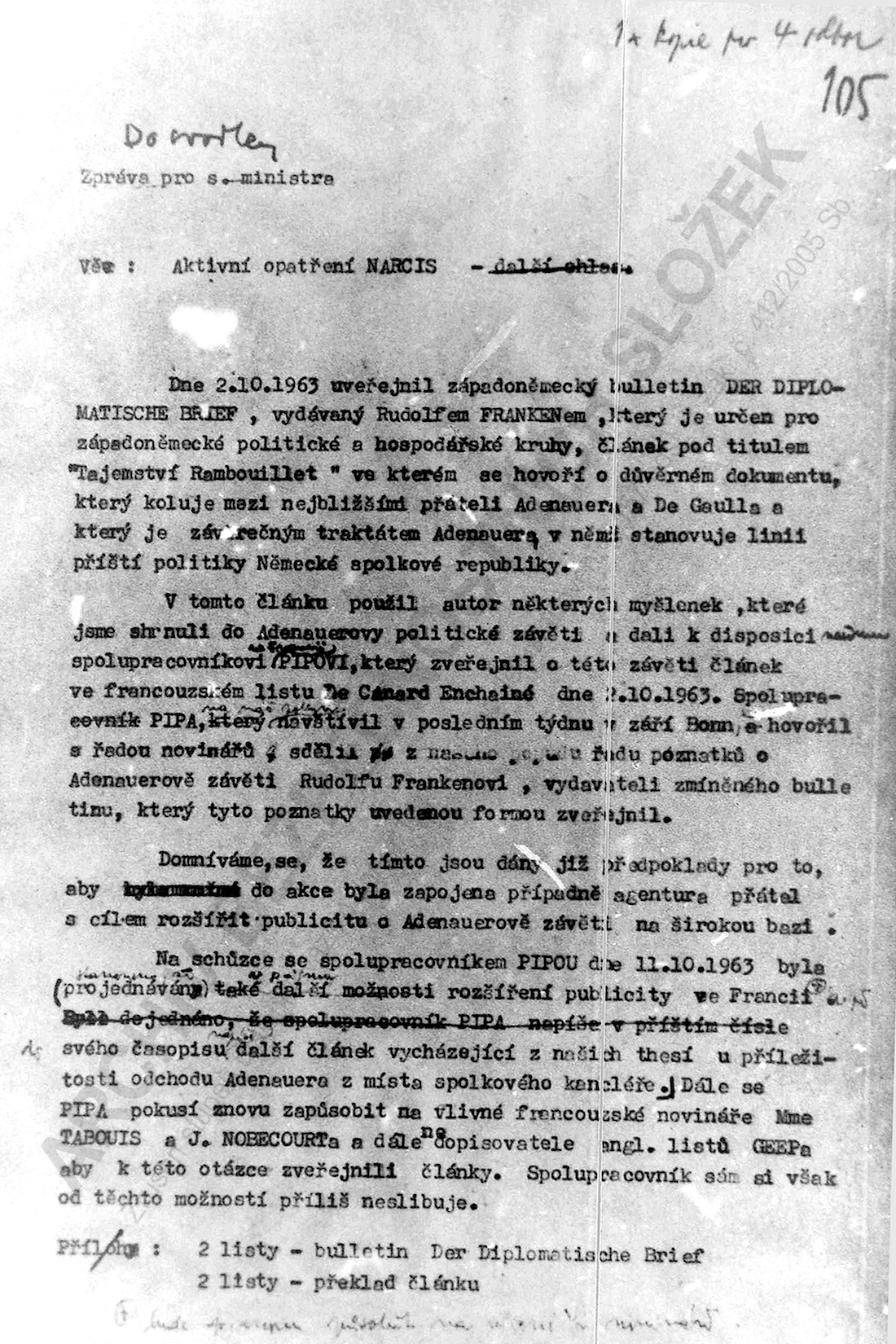
[1]Cf. National Archive, the Central Committee of the Communist Party, Commission fund, Vol. 12, ar. j. 201, sheet 94, page 13
[5]Cf. ABS, ZSGŠ fund, arch. no. 19861. Furthermore, ABS fund VKR arch. no. 12702
[6]Cf. ABS, fund 1 S SNB, personal file no. 41582
[7]Ibid
[8]Cf. ABS, fund 1 S SNB, personal file No. 41582/030
[9]Ibid.
[10]Ibid.
[11]Ibid.
[12]Ibid.




